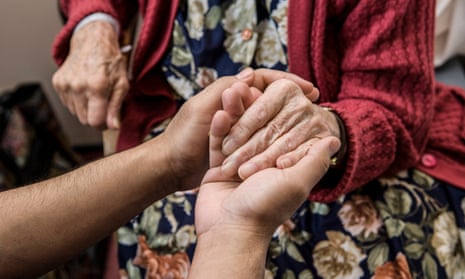News that half of care workers would now earn more in a job at a supermarket highlights the urgent need for a national social care workforce strategy (Report, 24 August). The government continues to assert that this is the responsibility of local authorities, but these are in no position to offer increased funding. Many have been selling assets or raiding reserves for years to protect what services they can.
The cost of living crisis has provided the tipping point. One of our support workers was recently forced to leave the job he loved because with his skills he could earn far more in the NHS. As a support worker, his pay was simply not representative of the complex work he did every day.
If the NHS outcompetes social care on pay, both lose. Thegovernment must benchmark minimum support worker pay at NHS band 3. Benchmarking pay against NHS pay scales will ensure that support workers receive parity of both esteem and pay, and would encourage people to change lives, not simply sit on checkouts.
Yes, it will cost more. But if we do not improve pay, both the NHS and social care will fail not just the older and disabled people who need these services the most, but all of us, at our most vulnerable time.
Rachael Dodgson
Chief executive, Dimensions
There is a crisis in the care of older people, and it is broader than the problems care homes are facing in attracting staff (Staffing crisis leaves many English care home residents’ basic needs unmet, 21 August).
Agencies providing care at home for older people face similar problems due to the low pay on offer, and the result is insufficient staff to provide care, or staff with inadequate training or understanding of the needs of older people. There is consequently the risk of neglect, abuse and poor care.
It does not help that, in addition to care being undervalued, it is also fragmented across health, social and private agencies without a plan about the best way to address the needs or enhance the wellbeing of older people. We need leadership at national and local levels to develop strategies to improve the wellbeing of older people, and a recognition that investing in their care will maintain their quality of life and ability to continue to contribute to the rest of society.
Dr Chris Allen
Consultant clinical psychologist, Berkshire NHS Foundation Trust
Having been a nurse for 44 years and, after retirement, a carer, I felt the need to write and ask why Brexit is seldom mentioned as one of the main causes for the appalling staff shortage in the health service generally, but even more so in the social care sector.
Many in the workforce returned to their home countries, suddenly feeling unwelcome and anxious. I worked with many from Poland, Romania, Spain and other European countries. It was tragic to see so many of my colleagues forced to leave by the hostile environment our government created. It left the remaining workforce with an overwhelming workload throughout the pandemic. The stress from this, combined with the low pay has caused many of those remaining to leave. The situation is now even worse due to the cost of living crisis.
The problems with the health and social care sector seem to be always blamed on the pandemic, which has certainly not helped, but no one mentions the loss of a wonderful workforce after Brexit. It is testimony to them that hospitals, care homes and community care were able to function, although not without problems from years of neglect. But without them now, nothing is functioning. As a country we should be ashamed.
It saddens me so to see and hear the awful situations that patients and carers are struggling with, and it seems that no one in government cares about the situation. All we hear is how much money it will give the NHS, but there appears to be no actual plan. I am fearful for the future, not just in health but for the country as a whole. We need some care and humanity back.
Debbie Black
Ventnor, Isle of Wight
